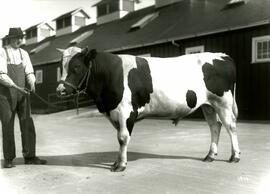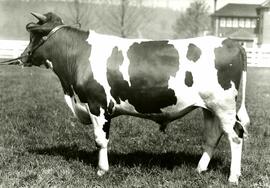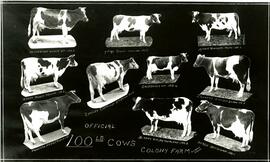Title and statement of responsibility area
Title proper
Assorted photographs of Colony Farm (Glass Negatives)
General material designation
- Graphic material
Parallel title
Other title information
Title statements of responsibility
Title notes
Level of description
Subseries
Repository
Reference code
Edition area
Edition statement
Edition statement of responsibility
Class of material specific details area
Statement of scale (cartographic)
Statement of projection (cartographic)
Statement of coordinates (cartographic)
Statement of scale (architectural)
Issuing jurisdiction and denomination (philatelic)
Dates of creation area
Date(s)
Physical description area
Physical description
113 photographs : b&w glass negatives ; 12.5 x 17.5 cm
37 photographs : b&w glass negatives ; 20 x 25 cm
8 photographs : b&w glass negatives ; 16.5 x 20.5 cm
4 photographs : b&w ; silver DOP print ; 20 x 25 cm
1 photograph : b&w glass negative ; 9 x 10 cm
5 photographs : b&w nitrate negative ; 12.5 x 17.5 cm
Publisher's series area
Title proper of publisher's series
Parallel titles of publisher's series
Other title information of publisher's series
Statement of responsibility relating to publisher's series
Numbering within publisher's series
Note on publisher's series
Archival description area
Name of creator
Biographical history
W. J. Moore was born in 1887 in Bryson, Quebec, one of eleven children of James and Elizabeth Moore. The family moved to De Winton, Alberta when Moore was in his early teens. By 1911 he had found work with commercial photographer Byron Harmon in Banff, Alberta. Harmon married Moore’s older sister Maude in 1907 and it is quite possible that Moore received his early photographic training from him.
Moore, his parents and several brothers and sisters settled in South Vancouver and Burnaby in 1912. Vancouver was then in the midst of an economic boom, but in 1913 it became a depression. Moore established a commercial photographic studio out of his home, first at East 21st Avenue and later on Sophia Street.
He bought a Kodak No. 8 Cirkut Outfit in 1913 and incorporated panoramic photographs as a specialty within his business, producing most of his work with this format in the first fifteen years of his career. After 1928, his use of this format was sporadic and production was solely by commission.
Moore worked on his own until mid-1915, when he formed a partnership with Wilfred F. McConnell, purchasing the Canadian Photo Company from O. J. Rognon and Fred P. Stevens. While in this partnership, Moore signed panoramic negatives under both his own name and the Canadian Photo Co. The partnership was dissolved in 1921, with Mr. McConnell operating his photographic business under the Canadian Photo Co. name until 1933.
In 1921, at the beginning of a decade of economic regeneration in Vancouver, Moore established his commercial studio out of the Winch Building on Hastings Street. William Read was hired as an assistant and worked with him for over thirty years, eventually purchasing the business in 1953 when Moore retired. He died in 1963.
Custodial history
The entire "W.J. Moore Collection of Negatives" was purchased by the Coquitlam Heritage Society in 2003 from Brian Wilson, who found the negatives at a garage sale near Summerland, BC. The Coquitlam Heritage Society donated a portion of the collection that related to Riverview Hospital and Colony Farm to the Riverview Hospital Historical Society in 2009. The glass negatives were housed on site at Riverview Hospital in the museum operated by the Riverview Hospital Historical Society until the museum closed in 2012. From that point until the point of transfer to the Archives, the negatives and prints were stored at the home of Anna Tremere.
Scope and content
The subseries consists of photographs thought to have been taken by W.J.Moore although it is possible they were taken by another photographer. The assumption of provenance has been assumed based on the context in which the negatives were found. It has not been possible to confirm. The photographs depict the buildings, livestock, farm workers (likely Essondale patients), and employees of Colony Farm and Essondale (Riverview Hospital). The subjects consist primarily of cows and horses, as Colony Farm was known across the province for the quality of its livestock. It was awarded a master breeder shield in 1930 from the British Columbia Branch of Holstein Canada. Many of the agricultural photographs also show Essondale's West Lawn building at various points in its construction.
Notes area
Physical condition
Several negatives are damaged to varying degrees. Damage ranges from small sections of flaking emulsion on the plate, to large sections of the plates that are broken. See individual descriptions for information about the condition of specific negatives.
Arrangement
The negatives in Subseries 01 were organized by the Coquitlam Heritage Society (CHS) when they were received in 2009. CHS imposed a numbering system that was maintained by the Riverview Hospital Historical Society and has been maintained in this current arrangement. The negatives in Subseries 02 and 03 were arranged by the City of Coquitlam Archives according to the original order in which they were transferred from the Riverview Hospital Historical Society.
Language of material
Script of material
Location of originals
Availability of other formats
Photographs also available as prints and digital files (.jpg and .tiff). Consult C5 - Box 2 and C5 - Box 3 for prints.
Restrictions on access
Access is restricted to prints to safeguard the glass negatives. Consult copy prints or digital scans.
Terms governing use, reproduction, and publication
Public Domain
Finding aids
Finding aid is available
Associated materials
For associated W.J. Moore photographs- see Coquitlam Heritage Society collection, Series 1, Subseries 1 (C4-S1-SS1)
Accruals
Alternative identifier(s)
Standard number area
Standard number
Access points
Place access points
Name access points
- Riverview Hospital Historical Society (Collector)
- Moore, William John (Subject)






























